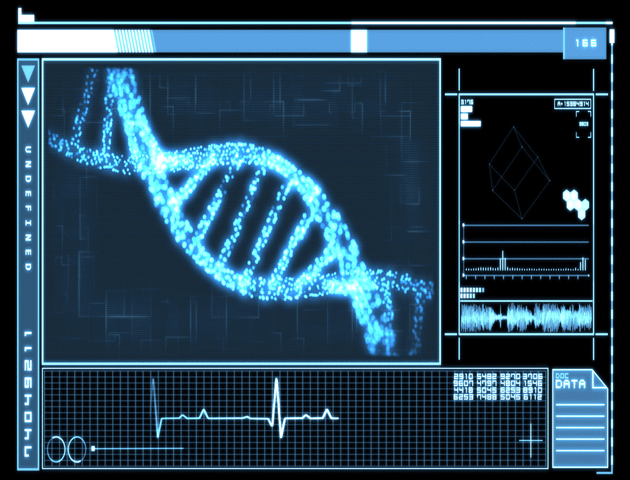
<a href="http://www.shutterstock.com/cat.mhtml?searchterm=dna&anyorall=all&search_source=search_form&lang=en&version=llv1&search_group=&safesearch=1&prev_sort_method=relevance2&sort_method=popular&page=1#id=114275635&src=47D4D112-7FB0-11E2-AFF4-401F1472E43D-1-81">wavebreakmedia </a>/Shutterstock
On Tuesday, the Supreme Court will hear oral arguments in a case that will decide whether cops should be allowed to force people they arrest to give a DNA sample. Since the early 1990s, 26 states have passed laws requiring DNA to be collected upon arrest for a serious offense, and loaded into a national database, where it can help match offenders to unsolved crimes. This is the first time the Supreme Court has reviewed this practice, and the case promises to produce one of the most significant Fourth Amendment rulings in years.
The case at hand, Maryland v. King, centers around Alonzo King, who was arrested in 2009 after he was accused of pointing a gun at a group of people in Maryland. The police took his fingerprints and swabbed the inside of his cheek for DNA. King was convicted on assault charges and sentenced to four years in jail, but when his DNA profile was found to match evidence from an unsolved 2003 rape case, he was charged with that crime and sentenced to life in prison. King appealed his sentence, arguing that because the police took his genetic info without his consent, the DNA sampling violated his rights under the Fourth Amendment, which prohibits unreasonable searches and seizures. The Maryland supreme court agreed, and the state appealed to the highest court in the land.
Maryland, and the other 49 states, argue that DNA collection is essential to help correctly identify arrestees and solve crimes, since it allows for more accurate identification than fingerprinting or other methods. (Some of you have asked what types of serious crimes police can collect DNA on. Some states allow collection for any type of felony; other states limit collection to violent or sexual crimes.) The federal DNA database has helped solve thousands of crimes by linking evidence from unsolved cases to people who have been arrested months or years after the trail has gone cold.
Jayann Sepich’s daughter Katie was brutally raped and murdered in 2003 in New Mexico, but her killer was not identified until three years later, after he was imprisoned for an unrelated offense. “Many, many times violent offenders are arrested but are not convicted immediately, or just plead guilty to a misdemeanor, and they continue to murder and rape again and again,” says Sepich, who has since founded DNA Saves, an organization that got New Mexico to pass a DNA testing law in 2007, and continues to push for similar laws around the country.
Civil-liberties advocates say that the utility of DNA collection doesn’t mitigate the unconstitutionality of swiping genetic information without permission. “Police justify their collection of DNA as being helpful in efforts to solve and prevent crime,” says Steven Benjamin, president of the National Association of Criminal Justice Lawyers. “The problem is that just because a technique permits more effective police work, it doesn’t absolve the constitutional problems. Taking DNA from mere arrestees is undeniably absolutely unconstitutional.”
Maryland and the federal government dismiss the claims that DNA collection is actually a search, saying it’s no more invasive than mandatory fingerprinting, which is legally protected. The federal government, in its friend of the court brief in support of Maryland, argues that “the inside of the cheek is readily accessible, visible to others when an individual speaks, yawns, or eats, and accustomed to touching with a toothbrush.”
Benjamin disagrees. “It’s obviously a search,” he says. “It’s a body cavity search, a forcible or coerced swabbing of the interior of person’s mouth to get their genetic code. By anyone’s definition, that is a police search of a very private area.”
Benjamin explains that it doesn’t matter if the police want to obtain your computer for its emails or a strand of your hair from your comb for DNA, they need a warrant to go into your home. Same goes for searching your mouth.
“What makes it unconstitutional is that there is no reason to believe that the biological material or information contained in the DNA will constitute evidence of a crime,” Benjamin says. “The existence of a reason to believe that a search will yield evidence of a crime is absolutely necessary for it to be considered reasonable.” Just because someone is being arrested as a suspect in a one particular crime does not mean that the police have any probable cause to search—i.e., swab—the arrestee for a connection to other unrelated, unsolved crimes waiting in some database for their match. King’s lawyer, Kannon Shanmugam, argues that King’s Fourth Amendment rights were violated because the state had no good reason to search and seize his DNA.
Maryland counters that mandatory DNA collection is quite reasonable—that the degree to which the search benefits the government and protects its citizens outweighs the degree to which it violates a person’s privacy. In the brief the state submitted to the court, it argues that while the intrusion on the detainee “is minimal…the State’s interests are significant…By testing arrestees, the State expands the database in a reasonably targeted fashion, avoids squandering investigational resources, spares innocent persons from becoming mistaken suspects, and prevents additional crimes that might otherwise occur.”
Chief Justice John Roberts has hinted at which way the court may swing. In an earlier order related to this case, he called DNA collection a “valuable tool for investigating unsolved crimes and thereby helping to remove violent offenders from the general population,” and suggested that “there is a fair prospect” that the court will uphold the constitutionality of the practice.












